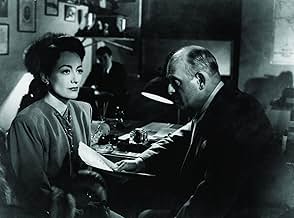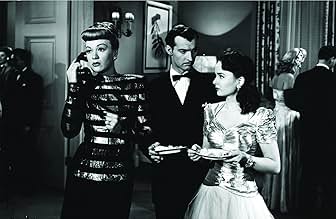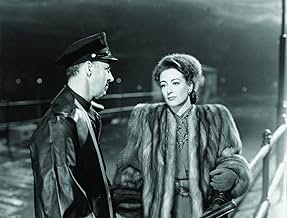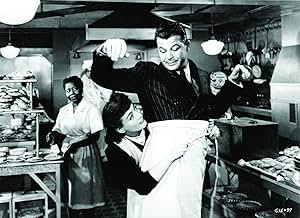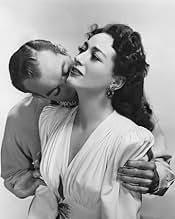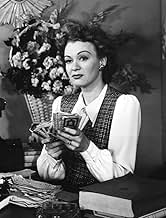Una madre trabajadora se acerca al desastre mientras se divorcia de su esposo y comienza un exitoso negocio de restaurantes para mantener a su hija mimada.Una madre trabajadora se acerca al desastre mientras se divorcia de su esposo y comienza un exitoso negocio de restaurantes para mantener a su hija mimada.Una madre trabajadora se acerca al desastre mientras se divorcia de su esposo y comienza un exitoso negocio de restaurantes para mantener a su hija mimada.
- Dirección
- Guión
- Reparto principal
- Ganó 1 premio Óscar
- 3 premios y 7 nominaciones en total
Bill Alcorn
- Soldier
- (sin acreditar)
Betty Alexander
- Party Guest
- (sin acreditar)
Ramsay Ames
- Party Guest
- (sin acreditar)
George Anderson
- Peterson's Assistant
- (sin acreditar)
James Anderson
- Diner Customer
- (sin acreditar)
Robert Arthur
- High School Boy
- (sin acreditar)
Lynn Baggett
- Waitress
- (sin acreditar)
Leah Baird
- Police Matron
- (sin acreditar)
Resumen
Reviewers say 'Mildred Pierce' is acclaimed for its strong female lead, complex dynamics, and themes of maternal love and social class. Joan Crawford's Oscar-winning performance is celebrated, and the film's noir elements are noted. However, some find the pacing slow and melodrama excessive, with Veda's character criticized. Despite this, it's seen as a classic with significant historical portrayal of women's roles.
Reseñas destacadas
James M Cain's novel 'Mildred Pierce' was much tougher, dirtier, violent and cynical than the gorgeously mounted movie it became, but the film still manages to maintain enough of the flavor of the book to be interesting. The portrait of working class life in Southern California works well, as does the depiction of a marriage that breaks down because of disappointment and resentment rather than anything melodramatic. Within its first hour MILDRED PIERCE captures something anxious about American life and marriages and families that is more true than most of what movies had shown up to that time, and it would prove to be even more so in the postwar world to come. The movie actually becomes more false and synthetic as it moves into Mildred's rise in life, but by then the plot and characters have taken hold.
And so has the film's increasingly bleak look at what women can expect when they live and work alone in a man's world, beset by men who want to exploit them, sexually and otherwise. This too, though softened from the book, would have seemed refreshingly frank to many of viewers at that time.
What raises the film to the level of classic is the first class work from every professional in every department. Joan Crawford is not much more expressive here than she was in her later MGM pictures, but this character suits her limited talents so well that she seems better than in almost anything else she did. All her Warners pictures used her more effectively than MGM usually managed to do, perhaps because in them she is invariably exploited, abused, maligned, even tortured. The bad behavior her Warners characters inspire in others is so extreme that she doesn't need to be. These plots do what Adrian's sometimes garish clothes did for her at MGM: they give her a personality, make her seem more interesting than she really was, and they make her sympathetic despite her essential coldness. Crawford gets able support from Ann Blyth, Eve Arden (as comedy relief; she is almost appearing in another movie entirely), Zachary Scott and especially Jack Carson, dead-on as a sweaty hustler and low rent lothario, bringing nuance to what could have been a one-note portrayal. Bruce Bennett isn't really a good actor in the role of Mildred's first husband, but he's perfectly cast -- he looks like an Okie from one of Dorothea Lange's photographs who went west to 'make it' and never did.
And as has been frequently mentioned here, Ernest Haller's cinematography (especially in the brilliant prints now being shown on cable) is consistently evocative and beautiful. So many of his shots live in the memory: in the scene where a mink wearing, gun wielding Mildred comes upon Monte and Vida kissing, the image is an almost primal one of betrayal and glamor -- the way their profiles are in darkness, the way Ann Blyth arches back against the bar, the hard, dim glitter of lame and the billows of tulle from her gown. The way Vida tumbles forward into almost blinding lamplight while Monte's face hardens behind her -- these are the kinds of wonderful images the best old films regularly delivered. Also excellent is Anton Grot's art direction, opulent but still managing to help create the particular SoCal atmosphere of this picture. And as usual, Max Steiner's score is effective, but as an earlier poster noted, he recycled a couple of motifs from his Oscar-winning score to NOW, VOYAGER. And director Michael Curtiz must be praised for keeping everything in perfect balance. This is one of the most admired '40s pictures and well worth a look.
And so has the film's increasingly bleak look at what women can expect when they live and work alone in a man's world, beset by men who want to exploit them, sexually and otherwise. This too, though softened from the book, would have seemed refreshingly frank to many of viewers at that time.
What raises the film to the level of classic is the first class work from every professional in every department. Joan Crawford is not much more expressive here than she was in her later MGM pictures, but this character suits her limited talents so well that she seems better than in almost anything else she did. All her Warners pictures used her more effectively than MGM usually managed to do, perhaps because in them she is invariably exploited, abused, maligned, even tortured. The bad behavior her Warners characters inspire in others is so extreme that she doesn't need to be. These plots do what Adrian's sometimes garish clothes did for her at MGM: they give her a personality, make her seem more interesting than she really was, and they make her sympathetic despite her essential coldness. Crawford gets able support from Ann Blyth, Eve Arden (as comedy relief; she is almost appearing in another movie entirely), Zachary Scott and especially Jack Carson, dead-on as a sweaty hustler and low rent lothario, bringing nuance to what could have been a one-note portrayal. Bruce Bennett isn't really a good actor in the role of Mildred's first husband, but he's perfectly cast -- he looks like an Okie from one of Dorothea Lange's photographs who went west to 'make it' and never did.
And as has been frequently mentioned here, Ernest Haller's cinematography (especially in the brilliant prints now being shown on cable) is consistently evocative and beautiful. So many of his shots live in the memory: in the scene where a mink wearing, gun wielding Mildred comes upon Monte and Vida kissing, the image is an almost primal one of betrayal and glamor -- the way their profiles are in darkness, the way Ann Blyth arches back against the bar, the hard, dim glitter of lame and the billows of tulle from her gown. The way Vida tumbles forward into almost blinding lamplight while Monte's face hardens behind her -- these are the kinds of wonderful images the best old films regularly delivered. Also excellent is Anton Grot's art direction, opulent but still managing to help create the particular SoCal atmosphere of this picture. And as usual, Max Steiner's score is effective, but as an earlier poster noted, he recycled a couple of motifs from his Oscar-winning score to NOW, VOYAGER. And director Michael Curtiz must be praised for keeping everything in perfect balance. This is one of the most admired '40s pictures and well worth a look.
The story that unfolds in Mildred Pierce is complicated and dark, and at its darkest, is a chilling portrait of a mother so devoted to her children (well, child, really) that she would go to any and all lengths for them. Although some of the situations and scenes suffer from the passage of time (the modern audience in the cinema, myself included, couldn't help laughing at some of the more ludicrous things said/done), the film as a whole worked, mostly on the strength of the performances.
Joan Crawford won her only Oscar for her role, and it was well-deserved--she held the film together with a confident performance that ranged from charming and sassy, to desperate and almost frightening. The final scenes of the film, especially, captured Mildred at her most pathetic, and Crawford looked utterly despondent in the telephone scene. Ann Blyth is utterly convincing as the spoilt, deeply disturbed Veda, narcissistic and unrelentingly manipulative of her mother. And the best supporting performance had to come from Eve Arden, who played Mildred's friend Ida--Arden saunters across the screen, stealing scenes left and right, before disappearing from view again. She was excellent!
The film is well worth the watch--not brilliant, but definitely very good. I also like the story-telling technique and the direction (the director made quite clever and frequent use of shadows and mirrors), and it's good that the darkness and melodrama was frequently mitigated by the well-written dialogue. 8/10.
Joan Crawford won her only Oscar for her role, and it was well-deserved--she held the film together with a confident performance that ranged from charming and sassy, to desperate and almost frightening. The final scenes of the film, especially, captured Mildred at her most pathetic, and Crawford looked utterly despondent in the telephone scene. Ann Blyth is utterly convincing as the spoilt, deeply disturbed Veda, narcissistic and unrelentingly manipulative of her mother. And the best supporting performance had to come from Eve Arden, who played Mildred's friend Ida--Arden saunters across the screen, stealing scenes left and right, before disappearing from view again. She was excellent!
The film is well worth the watch--not brilliant, but definitely very good. I also like the story-telling technique and the direction (the director made quite clever and frequent use of shadows and mirrors), and it's good that the darkness and melodrama was frequently mitigated by the well-written dialogue. 8/10.
Joan Crawford plays the title role, a mother who will do anything for her selfish daughter Veda, played by Ann Blyth. Mildred even goes into business, becoming a successful restaurant owner, but Veda is still ungrateful even as her mother has provided her opportunities in society.
Jack Carson plays Wally Fay, a man Mildred manipulates; Zachary Scott is Monte Beragon, another who gets involved in a tragic love triangle of sorts with Crawford's and Blyth's characters. Eve Arden plays Ida Corwin, a friend of Mildred's who later becomes one of her employees, that gets to say some great sassy lines including "Personally, Veda's convinced me that alligators have the right idea. They eat their young."
Eventually, the daughter gets herself in deep trouble and the mother's sacrifice is made even greater. Directed by Michael Curtiz, and based on the James M. Cain novel with a screenplay by Ranald MacDougall, this essential drama also features Bruce Bennett, Lee Patrick, Veda Ann Borg, and Butterfly McQueen (uncredited).
Joan Crawford's Academy Award winning Best Actress performance on her first (!) of three nominations. Also Supporting Actress Oscar nominations for Arden (her only!) and Blyth (her only as well). The film, its B&W Cinematography, and MacDougall's (his only) screenplay were also nominated. Added to the National Film Registry in 1996.
Jack Carson plays Wally Fay, a man Mildred manipulates; Zachary Scott is Monte Beragon, another who gets involved in a tragic love triangle of sorts with Crawford's and Blyth's characters. Eve Arden plays Ida Corwin, a friend of Mildred's who later becomes one of her employees, that gets to say some great sassy lines including "Personally, Veda's convinced me that alligators have the right idea. They eat their young."
Eventually, the daughter gets herself in deep trouble and the mother's sacrifice is made even greater. Directed by Michael Curtiz, and based on the James M. Cain novel with a screenplay by Ranald MacDougall, this essential drama also features Bruce Bennett, Lee Patrick, Veda Ann Borg, and Butterfly McQueen (uncredited).
Joan Crawford's Academy Award winning Best Actress performance on her first (!) of three nominations. Also Supporting Actress Oscar nominations for Arden (her only!) and Blyth (her only as well). The film, its B&W Cinematography, and MacDougall's (his only) screenplay were also nominated. Added to the National Film Registry in 1996.
Joan Crawford won the Academy Award for Best Actress for her portrayal of the title character in this 1945 offering by Warner Brothers. Ms. Crawford was in her prime then and members of my generation, who remember her in films such as 1968's Berserk and 1970's Trog, are sometimes surprised to learn how attractive and talented she was in her heyday. The mean-spirited commentary of her life which we have been subjected to since her death in 1977 notwithstanding, still there was a certain hard edge to her personality which shown through in her screen roles. That she was able to win filmdom's greatest prize by playing a willing victim and vulnerable woman is perhaps the greatest tribute to her abilities as an artist. At any rate, she was the star of this film noir classic, a story that holds up well after 57 years. Mildred Pierce was an ordinary housewife of the era. No skills, relied on her husband for sustenance and leadership and was crushed when he ditched her for another woman. Her daughters were her whole life, doting unhealthily on Veda, the older one, especially (a very young Ann Blyth, herself nominated for Best Supporting Actress for this film). But, Veda was a schemer, conniver and social climber from the word go and it was ultimately her actions which brought an interesting human interest story to a thunderous climax. The story fascinates as we see Crawford, through iron will and determination, become an independent, successful business woman even as she makes tragic error after tragic error in her personal life. Mildred Pierce really is a rare animal, as it truly is more of a human interest story than any other in the film noir genre. The cast is great: Jack Carson, outstanding as Mildred's lifelong friend and would-be suitor, Bruce Bennett as Mildred's nice but weak-willed husband, Zachary Scott as the caddish successor to Bruce Bennett for Mildred's affections, and Eve Arden (still another nomination for Best Supporting Actress) in one of her trademark roles as a no nonsense gal pal. In Mildred Pierce, we have murder, love, misguided love, love not reciprocated, jealousy, misunderstanding, and good intentions/bad results. Could it be this film is so intriguing because we see in our own lives one or more of these very human conditions?
Six shots fired and a man falls down dead. Shortly thereafter, we meet a desperate Mildred Pierce who walks along the streets of the night. After a policeman prevented her from jumping into the river, she ends up at a bar where an old acquaintance flirts uncontrollably. They go to her house on the beach, from Mildred suddenly quickly departs. It turns out that it was in this house that the man was shot and soon the police on the spot. During interrogation begins the story of what led up to that fateful night. Mildred tells how she differs from her husband, working upward as a business woman and how she is willing to do absolutely everything to their already spoiled daughter Veda.
Mildred Pierce literally sparkles. Director Michael Curtiz, probably best known for Casablanca, knows how to get the luxurious feel of a grand noir drama. Elegant small transitions, meticulous and dramatic lighting applications, all in classic Hollywood manner, where nothing is left to chance.
The dialog is fabulous. Mildred's right hand Ida is so cool, with the hatching of witty one-liners. Even the ever-swarming Wally Fay is constantly exciting to listen to.
The story in itself is exciting, where you always know roughly how it will end, but not why or what role some of the characters will play. The characters are the driving force. It's about Mildred's efforts to give their daughters the life she had wanted, although it also means she does not listen to what they really want. Then there is a former spouse who is living his new life in the periphery, the friend who is helpful, but not without being sure to reap the rewards of Mildred's success and even a new one that might not be what he appears to be.
Crawford got a well-deserved Oscar for this film.
Mildred Pierce literally sparkles. Director Michael Curtiz, probably best known for Casablanca, knows how to get the luxurious feel of a grand noir drama. Elegant small transitions, meticulous and dramatic lighting applications, all in classic Hollywood manner, where nothing is left to chance.
The dialog is fabulous. Mildred's right hand Ida is so cool, with the hatching of witty one-liners. Even the ever-swarming Wally Fay is constantly exciting to listen to.
The story in itself is exciting, where you always know roughly how it will end, but not why or what role some of the characters will play. The characters are the driving force. It's about Mildred's efforts to give their daughters the life she had wanted, although it also means she does not listen to what they really want. Then there is a former spouse who is living his new life in the periphery, the friend who is helpful, but not without being sure to reap the rewards of Mildred's success and even a new one that might not be what he appears to be.
Crawford got a well-deserved Oscar for this film.
¿Sabías que...?
- CuriosidadesAfter seeing the film, James M. Cain sent Joan Crawford a signed first edition of the original novel. The inscription read: "To Joan Crawford, who brought Mildred Pierce to life just as I had always hoped she would be, and who has my lifelong gratitude."
- PifiasAfter Mildred has left Wally in the beach house with the corpse of Monte, Wally discovers that the doors in the house are locked. He must break the glass in a French door to get out. People can unlock a door from the inside to get out of a house, so breaking the glass would have been unnecessary. However, there is no reason to assume that Wally had the keys or even knew where they were located.
- Citas
Ida Corwin: [to Wally about his lustful looks in her direction] Leave something on me. I might catch cold.
- Créditos adicionalesThe opening credits are presented with a background ocean scene that "washes" the credits on the screen.
- Versiones alternativasAlso shown in computer colorized version.
- ConexionesFeatured in Hollywood: The Fabulous Era (1962)
- Banda sonoraYou Must Have Been a Beautiful Baby
(uncredited)
Music by Harry Warren
Lyrics by Johnny Mercer
Played and sung at Wally's club toward the beginning
Also played when Veda and Ted are at Wally's club
Selecciones populares
Inicia sesión para calificar y añadir a tu lista para recibir recomendaciones personalizadas
- How long is Mildred Pierce?Con tecnología de Alexa
Detalles
- Fecha de lanzamiento
- País de origen
- Idiomas
- Títulos en diferentes países
- El suplicio de una madre
- Localizaciones del rodaje
- Empresa productora
- Ver más compañías en los créditos en IMDbPro
Taquilla
- Presupuesto
- 1.453.000 US$ (estimación)
- Recaudación en todo el mundo
- 11.751 US$
- Duración1 hora 51 minutos
- Color
- Relación de aspecto
- 1.33 : 1
Contribuir a esta página
Sugerir un cambio o añadir el contenido que falta

Principal laguna de datos
What is the streaming release date of Alma en suplicio (1945) in Brazil?
Responde



